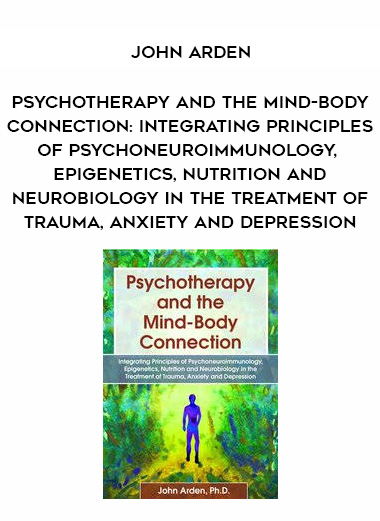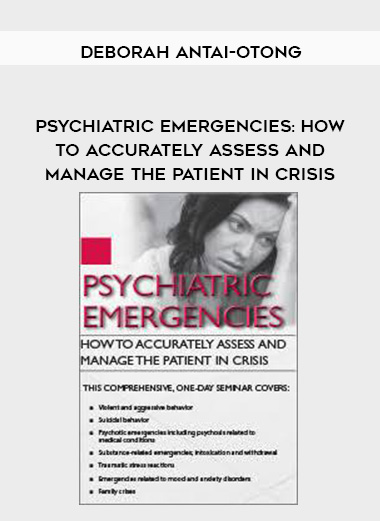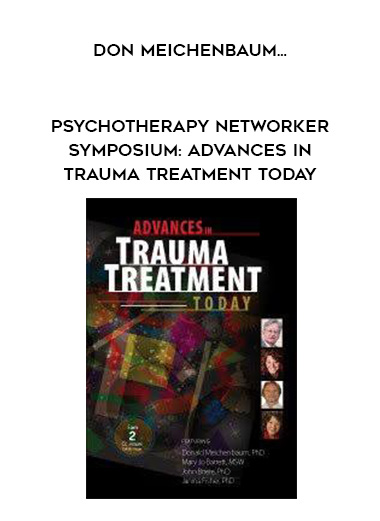PSYCHOTHERAPY AND THE MIND-BODY CONNECTION: INTEGRATING PRINCIPLES OF PSYCHONEUROIMMUNOLOGY, EPIGENETICS, NUTRITION AND NEUROBIOLOGY IN THE TREATMENT OF TRAUMA, ANXIETY AND DEPRESSION – JOHN ARDEN
Discover why this groundbreaking training has been described as a wake-up call for therapists in the 21st century… integrating cutting-edge research, identifying common factors of effective therapy, and leveraging powerful systems in the body to dramatically improve outcomes for your clients.
Mental health isn’t just affected by what happens above the neck.
Our nutrition, gut health, epigenetics, the immune system, and several other interconnected systems throughout the body all play a vital role in treating anxiety, depression, and trauma.
That means it’s no longer good enough to just focus on integrating different models of therapy… the future of psychotherapy lies in integrating both the mind and the body in your treatment.
Introducing: Psychotherapy and the Mind-Body Connection
Integrating Principles of Psychoneuroimmunology, Epigenetics, Nutrition, and Neurobiology in the Treatment of Trauma, Anxiety, and Depression
In this revolutionary training, Dr. Arden brings these complex topics down to earth, providing you with an integrative framework to build a solid foundation for therapy to get better outcomes for your clients faster.
You’ll discover specific techniques you can use in therapy that apply the latest developments in neuroscience, easy-to-understand scripts to use with your clients, and creative analogies that help you and your clients connect the dots.
Bringing the Future of Psychotherapy to Your Practice
While supervising hundreds of interns as the training director in the renowned Kaiser Permanente system in California, Dr. John Arden discovered how powerful this mind-body approach was when he started seeing changes in both his own clients and the clients of his colleagues.
In treating the whole person, their time in therapy got shorter, and they were getting better sooner.
In this online course, Dr. Arden reveals how cutting-edge research in both psychology and other related fields (including psychoneuroimmunology, nutrition, epigenetics, and neurobiology) are now bridging the gap and showing you…
- How to use the latest developments in neuroscience to choose therapeutic interventions that fit your client
- What the common factors are between the types of therapy, and why taking different paths can still lead us to the same successful outcomes
- How the feedback loops in both the mind and the body work in tandem to affect clients’ mental health…
While it might feel overwhelming to think about keeping up with the research across all these fields, and some therapists worry that it goes beyond their scope of practice…
The reality is that all you need is a basic understanding of how these puzzle pieces fit together to make dramatic improvements and distinguish yourself from your colleagues.
Plus, without it, our work in therapy can feel like trying to build a house on a windswept sandbar.
What You’ll Learn in This Exclusive Online Course:
In these 7 comprehensive modules, you’ll learn how these powerful, interconnected systems work throughout your client’s life to affect their mental health… and how to leverage them to make therapy more effective.
Session 1:
The Mind-Brain-Gene Connection: It’s not as simple as “bad genes”
- Why earthworms don’t suffer from panic disorders or depression (even though your clients share the same amount of genes)
- How therapy creates a “safe emergency” to create changes in the brain
- Why belly fat causes alarm systems in the brain, triggers the immune system, and increases the risk of depression (and how to communicate this to clients without psychobabble)
- How trauma might be passed down over generations in our genes
Session 2:
SEEDS: How 5 lifestyle factors impact brain functioning and mental health
- How focusing on these 5 lifestyle factors at the beginning of each session can help your clients experience less anxiety, depression, and distress from trauma
- The Snake Temple Principle that demonstrates how to effectively control fear and anxiety
- Why exposure with your clients won’t be nearly as effective until they get their “second wind”
- How taking melatonin REALLY affects sleep (and why it’s like Seasonal Affective Disorder in a bottle)
- How the brain creates “etch-a-sketch memories” for some experiences and “stone tablet memories” for others
Session 3:
Habits and Motivation: The science behind making lasting positive change
- How to put your client in the optimal state to rewire their brain quickly
- What jugglers, musicians, bilinguals, and London cab drivers all have in common (and how this can create hope for positive change in your clients)
- Why white knuckling through cravings and “just say no” don’t work, and how the middle path using Eastern philosophy or mindfulness practices results in better outcomes
- How to put your client in the optimal state to rewire their brain quickly
- How small changes in the social/cultural landscape turned Iceland’s youth from the most out-of-control to among the most well-behaved in Europe (and how to implement the same principles to help your clients)
Session 4:
The Social Self: How connection keeps both the mind and body healthy
- Why loneliness is as detrimental to your health and longevity as smoking
- How your attachment style as a therapist affects what you perceive in the therapy office and how you respond in couple’s therapy
- How early attachment changes your stress thermostat
- How social isolation creates a downward spiral, making clients less likely to be successful in social situations and less likely to engage
- How the brain and body treat laughter like the best medicine
Session 5:
Self-Organization: Balancing the mental networks to improve mental health
- The 3 operating systems that your brain shifts between constantly (and how these get out of balance in depression, schizophrenia, and ADHD)
- How to “speed up” the slow track and activate underactive brain areas to improve anxiety
- Why shifting from looking at the big picture to taking smaller steps creates changes in the brain that improve depression and anxiety
- How teaching your clients this simple acronym can help them B.E.A.T. panic
Session 6:
OCD and PTSD: Improving control and bridging the treatment gap with common factors
- The “Pink Elephant Paradox” and how to break your clients with OCD out of autopilot mode and slow down the fear network
- The 5 steps that help clients with OCD break out of autopilot, build new positive habits, tame the fear center, and strengthen the brakes on the alarm button
- The 2 factors that help predict whether someone will develop PTSD after a traumatic event (and what determines if PTSD will become chronic)
- How encouraging “urge surfing” can help your clients tolerate distress and prevent avoidance behaviors after trauma
Session 7:
Depression: Transcending rigidity and jump-starting the system
- Why your body treats depression like the flu and leads to “sickness behaviors”
- Using an “orchestra conductor” approach to simultaneously activate some feedback loops while down-regulating others
- How to use the principles of neuroscience to re-balance the brain hemispheres and reduce depression
- How mindfulness changes both the structure and activity in the brain to regulate affect and boost mood
Tag: Psychotherapy and the Mind-Body Connection: Integrating Principles of Psychoneuroimmunology, Epigenetics, Nutrition and Neurobiology in the Treatment of Trauma, Anxiety and Depression – John Arden Review. Psychotherapy and the Mind-Body Connection: Integrating Principles of Psychoneuroimmunology, Epigenetics, Nutrition and Neurobiology in the Treatment of Trauma, Anxiety and Depression – John Arden download. Psychotherapy and the Mind-Body Connection: Integrating Principles of Psychoneuroimmunology, Epigenetics, Nutrition and Neurobiology in the Treatment of Trauma, Anxiety and Depression – John Arden discount.




